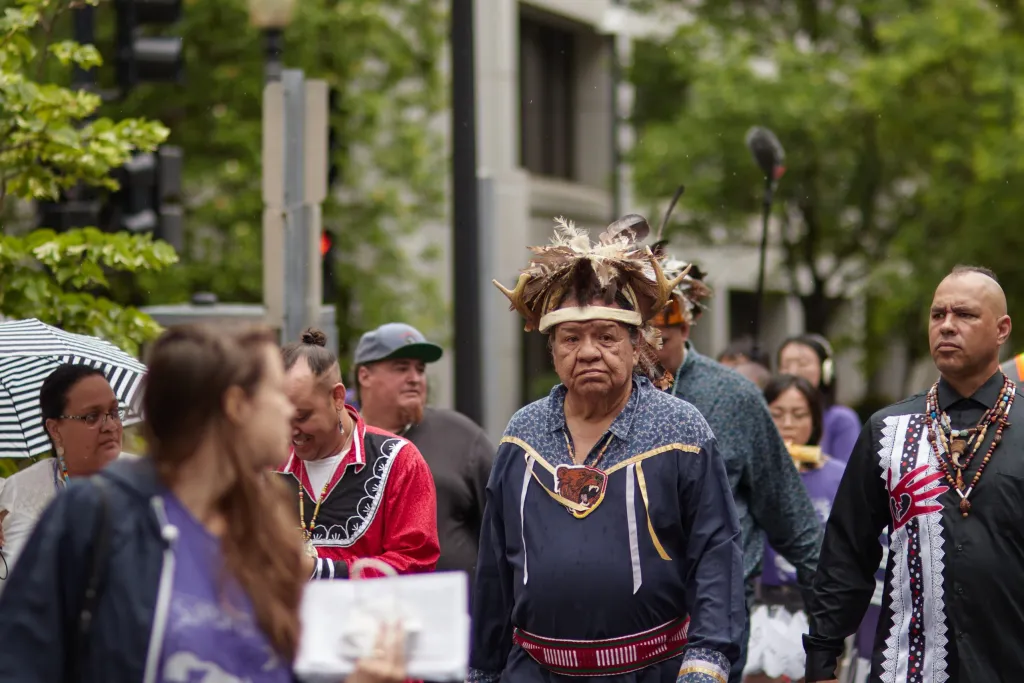On July 3, the New York State Appellate Court, Fourth Department, found that several rulings by the tribal courts of Clint Halftown’s Cayuga Nation could not be recognized by New York State institutions. This affirmed a previous set of rulings in the Seneca County Supreme Court. A news release from gayogohono.org stated that the ruling “represents a significant move towards life free from harassment for the targeted families, and speaks to their years of continued resistance to Halftown’s oppression.”
The Gayogo̱hó:nǫ’ (Cayuga) people are members of the Haudenosaunee Confederacy, an alliance of six sovereign Indigenous nations. Traditionally, a democratic, egalitarian system based on the Great Law of Peace has governed the Confederacy.
In this system, clan mothers settle most matters, deciding how property is shared and selecting men from their clans to be chiefs. Even once these chiefs are condoled (installed), the clan mothers reserve the right to remove chiefs who do not follow the Great Law of Peace and the clan mother’s warnings.
According to Sachem Sam George, condoled chief of the Bear Clan of the Gayogo̱hó:nǫ’ nation, when a decision needs to be made in this system, “each chief and clan mother has a clan meeting to discuss the subject, and if everybody comes to one mind, clan mothers get together and discuss it. If they all come to one mind, then they tell the chiefs. We all come to one mind on it also.” Making a unilateral decision is considered a removable offense.
In 2003, Clint Halftown became the Federal Representative for the Cayuga Nation, a position created by the federal government. In 2004, he strayed from the Council of Chiefs to make a deal with then-Governor George Pataki to develop a casino in the Catskills. This move, which undermined the teachings and will of the chiefs and clan mothers, set a leadership dispute in motion that continues to this day. The Cayuga Nation government under Halftown denies there is a leadership dispute.
When his clan mother tried to strip him of his responsibilities, Halftown refused to recognize this. Despite many letters and protests by the Gayogo̱hó:nǫ’ Council and allies, the US Bureau of Indian Affairs continues to recognize Halftown as the legitimate representative of the Cayuga Nation. Thus, it undermines the power of the traditional chiefs and clan mothers of the Gayogo̱hó:nǫ’.
Since 2004, Halftown has only strengthened his control of the Cayuga Nation, with no existing process to remove him or anyone on his Council from power. He has used the Cayuga Nation Police—no officers of which are Indigenous—to destroy a longhouse and then a barn in which language classes and ceremonies took place. Buildings, including homes, stores, and a daycare center have been demolished by his forces. “What really got to me was when he destroyed the garden. It’s like George Washington all over again,” commented Sachem George, referencing the 1779 expedition under General John Sullivan into Haudenosaunee country to destroy villages and crops.
Halftown’s new form of government also, as of recently, includes a tribal court. Notably, its judges are all non-Indigenous, and its rulings have all gone in favor of Halftown against a Gayogo̱hó:nǫ’ citizen. In a press release from the Cayuga Nation, Halftown is quoted as saying, “Our governing Council established the court system to bring order and justice, appointing experienced judges to ensure fairness and due process.”
Halftown sought to have a number of tribal court decisions recognized by New York State courts. These decisions involve evicting people from their homes and seizing tens of thousands of dollars from Gayogo̱hó:nǫ citizens, allegedly for back rent. For elaborate reasons, both structural and procedural, they were found not worthy of recognition by New York State on July 3. There are pending proceedings in New York State regarding the recognition of other tribal court judgments.
Joe Heath, general counsel for the Onondaga Nation (another member of the Haudenosaunee Confederacy) and attorney on behalf of the traditional chiefs and clan mothers of the Gayogo̱hó:nǫ’, said that he expected this ruling but that these cases are only the beginning of a series of legal battles. “[Halftown] will keep coming, and the citizens will keep resisting. And the lawyers—we have four of us who work mostly without pay—we’ll keep resisting.”
The July 3 decisions, a Cayuga Nation press release states, “did not invalidate the Nation’s Court or exempt Nation citizens from complying with the Nation’s laws and traditions. Federal law upholds the Nation’s sovereign right to enforce its laws and regulate its citizens’ activities within its Reservation.”
The recent Appellate Court decision, according to Heath, “will not stop Halftown’s mercenaries and courts from attacking citizens who oppose him. But at least for now and for over two years, [Halftown] has not been able to complete this sweep of citizens who oppose him.” Sachem Sam George said he wanted readers to understand that “The courts did do something for us, but they’re not doing enough for us. We need more done.”

Sachem Sam George, condoled chief of the Bear Clan of the Gayogo̱hó:nǫ’ nation, marches with #HalftownMustGo in D.C. in 2022. Aaron Fernando
